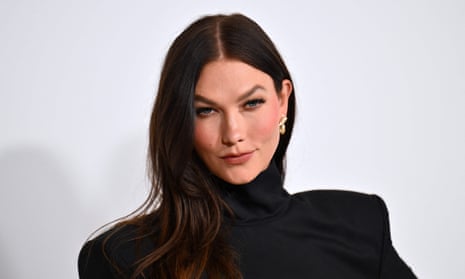In 2006, the then 25-year-old real estate heir Jared Kushner bought the New York Observer – and went on to own it for more than a decade. Almost 20 years later, Kushner’s sister-in-law, the supermodel and entrepreneur Karlie Kloss, bought the British fashion publication i-D from Vice Media Group, months after the company filed for bankruptcy.
Kloss’s acquisition of i-D through her media company, Bedford Media, comes three years after she and a group of other high-profile investors including her fellow model Kaia Gerber bought W magazine.
The 2006 and 2023 sales of the Observer and i-D – from two very different people who are, coincidentally, members of the same family – reflect a steady evolution in the stewardship and direction of journalism and digital media amid years of uncertainty. Where we’ve often seen billionaires and private equity take ownership of media outlets, we’re now, too, seeing supermodels such as Kloss and Gerber pivot to invest in media themselves.
“What’s happening is that people with the means are finding things they care about and deciding to rework them so they stay alive, and it’s not just traditional businessmen with the means any more,” said Karen North, a professor of communication at USC’s Annenberg School for Journalism and Communication.
North drew a comparison to the recent revival of Toys R Us after the retailer shuttered in 2018: “We’re seeing new things come along – the entrepreneurs from different walks of life, from different areas of industry, looking to see whether there’s a way to, instead of to start with a startup, take something that already exists, that already has enjoyed a certain amount of success, guide it into a new direction.”
Instability within the media industry has often been met with intervention from wealthy, high-profile businesspeople dressed as benefactors. Kloss’s recent purchase of i-D, as a fashion industry icon now breaking into fashion media, reflects a diversification of who these ostensible benefactors are, at a time when media companies are gasping for air.
At the Observer, Kushner reportedly oversaw the magazine with a heavy hand, allegedly exerting significant control over editorial operations. He departed in 2017 and joined the Trump administration. It’s not immediately clear how Kloss will wield her powers as CEO of i-D, but her decision to acquire the fashion and art magazine speaks to the possible allure of investing in media as a demonstration of status and taste.
Daisy Alioto, who founded the blockchain-based company Dirt Media as a counter to the financial struggles of traditional digital media in 2020, sees callbacks to the Renaissance in a business deal like Kloss’s purchase of i-D.
“It reminds me of this very old thing, which is patronage. This old concept, where when people attain a certain level of wealth, there’s only so many things you can buy, and if you have an inclination towards art and entertainment, it makes sense that you would enter some form of patronage around that, not just for profit,” Alioto said.
A memo from Vice Media Group on the i-D sale said Kloss had “deep roots in the fashion industry and has established herself as an entrepreneur who has a vision for the future of i-D and the industry at large.” Kloss, who runs Kode With Klossy to offer free coding camps to girls, “has a deep passion for technology and the intersection of fashion, media, and culture on a global basis”, it continued.
Influencers, models and celebrities more generally have been pursuing business endeavors for years, and, as Alioto sees it, every one of their companies is “already a media company”.
Take Kendall Jenner’s tequila brand or her sister Kylie’s cosmetic brand, or even how, Alioto points out, Glossier started as a blog: “It’s their celebrity, their branding, their media that people are buying, it’s why someone would buy 818 instead of another tequila,” she explained. “We’re entering a period where, in a sense, media is struggling astronomically – but it’s also never been more powerful as an idea.”
The pivot by celebrities to owning and running media companies isn’t such a leap from Jenner launching 818, or Dua Lipa starting her newsletter/book club Service95.

“We’re going to see more people [like Kloss] positioning themselves as patrons of media, because media takes curation, it’s about tastemaking more, maybe, than traffic scale, proprietary data,” said Alioto.
That someone like Kloss would take the reins of i-D makes more sense as the publication becomes an extension of her media image and legacy. A unique aspect of digital media, North said, was “that we feel like we have these personal relationships with people, even when we don’t, through the internet, we feel a connection”. When those we feel connected to “take the reins of something, the audience can feel more connected with that product, service, or organization.”
Unexpected lifelines may be the only future for beloved or niche outlets and magazines. Writers ranging from veteran journalists to tastemaking influencers are monetizing Substacks and Patreons. Alioto’s Dirt is pioneering and experimenting with new financial paths for publishing through NFTs and the blockchain. And there’s worker-owned media like Defector Media, founded and staffed by former Deadspin writers who resigned in protest of the private equity-owned G/O Media after it directed them to “stick to sports” amid the Trump presidency in 2019.
Defector has maintained a devoted readership since it opened in July 2020, generating $4.5m in revenue over 2023 up from $3.8m in 2022.
“Three years in, we’ve shown that we can satisfy the base conditions within the hierarchy of professional needs,” the company wrote in a 2024 report. “Those conditions are hard to come by in the media industry, we’re proud to have achieved them, and we absolutely don’t take them for granted.”
It’s an “interesting time” for digital media, between worker-run publications, new financial models like Dirt Media, or fashion industry icons like Kloss swooping in to save a beloved publication like i-D from its bankrupt parent company, North said.
And, she added, it’s only going to get more interesting: “The creativity of the digital age, the eagerness for partnerships, collaborations – there’s a growing sense that there’s more ways to be successful, and be successful together.”
